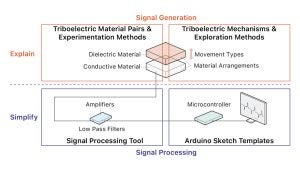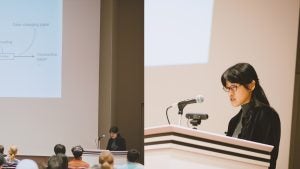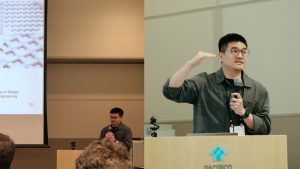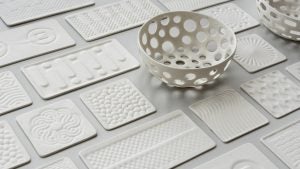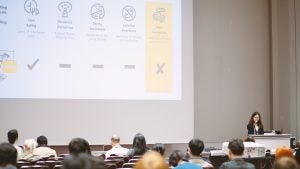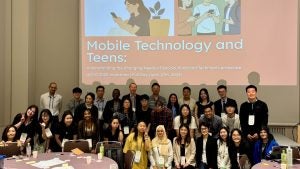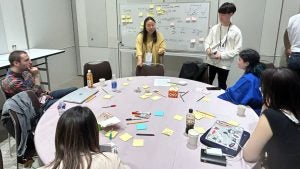RESEARCH IMPACT & COLLABORATIONS
CDE Research Newsletter Issue 05 2025
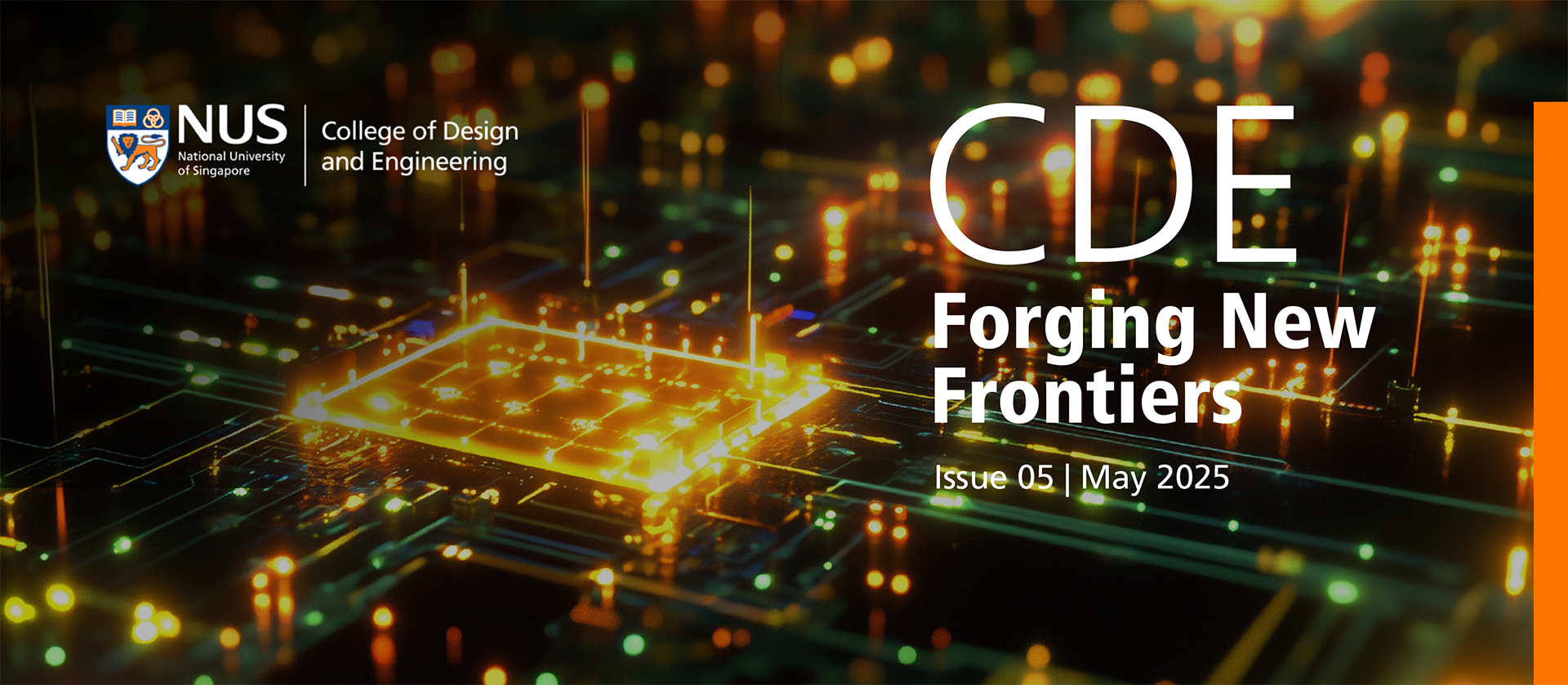
Microelectronics have impacted so many facets of our daily lives, on a global scale. From helping artificial intelligence to achieve new heights, to driving our handheld technologies of tomorrow, the microelectronics domain has soared to new frontiers - here at CDE. Read more in the latest edition of the CDE Forging New Frontiers Research Newsletter, which includes research features from:
CDE faculty lead key programmes under NUS sustainability initiative
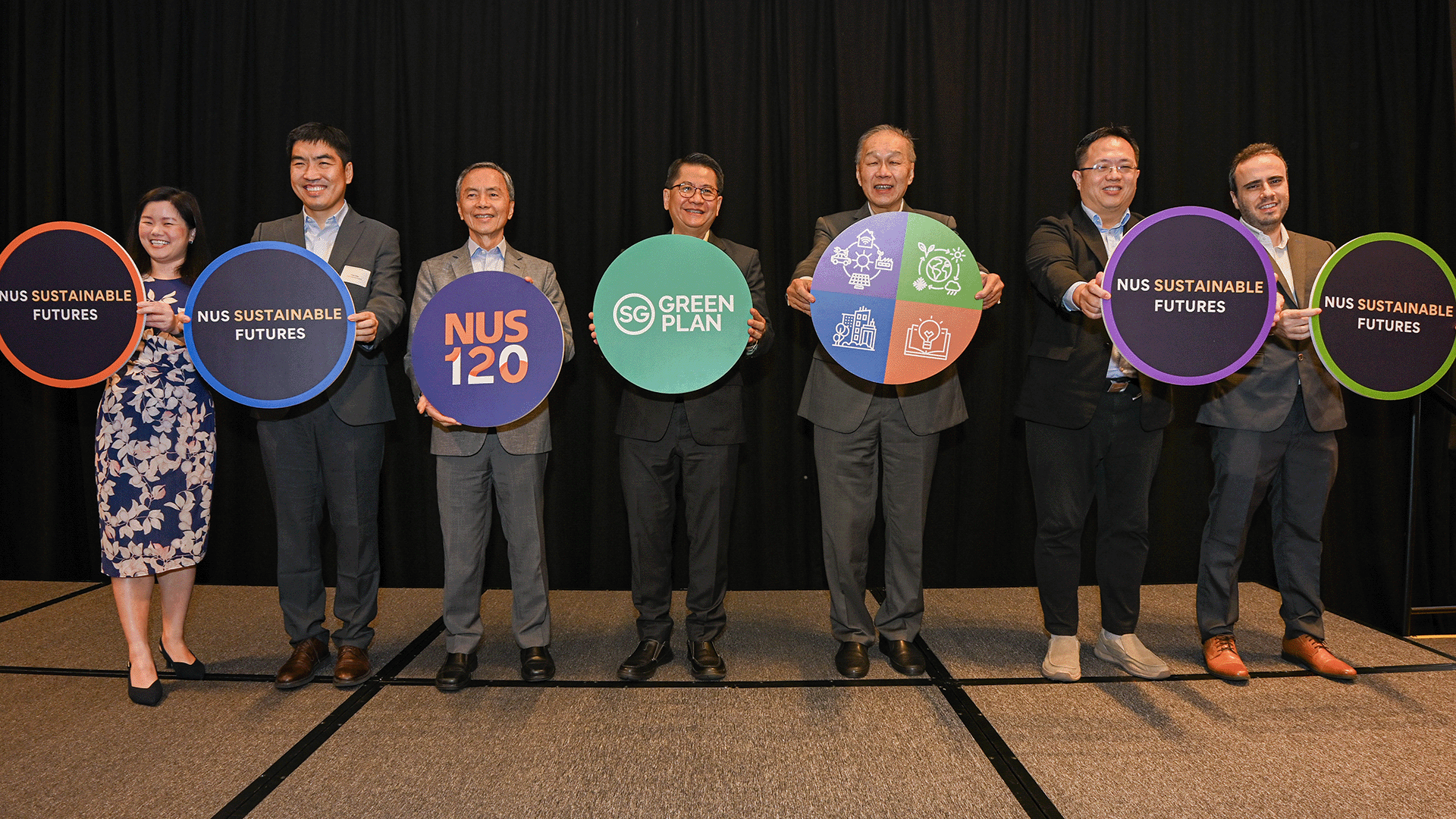
Two CDE faculty members — Professor Lee Poh Seng (Mechanical Engineering) and Associate Professor Chao Yuan (Architecture) — are taking on leadership roles in NUS Sustainable Futures, a bold new University-wide initiative launched on 6 May to drive interdisciplinary solutions for climate and sustainability challenges.
Prof Lee will lead research efforts to advance energy resilience in tropical cities, while Assoc Prof Yuan will spearhead initiatives in sustainable urban development across Singapore and ASEAN.
Their work reflects CDE’s strong commitment to shaping a greener, more resilient future through innovation, collaboration, and real-world impact.
Read more here.
Harnessing digital technology and artificial intelligence (AI) to revolutionise healthcare
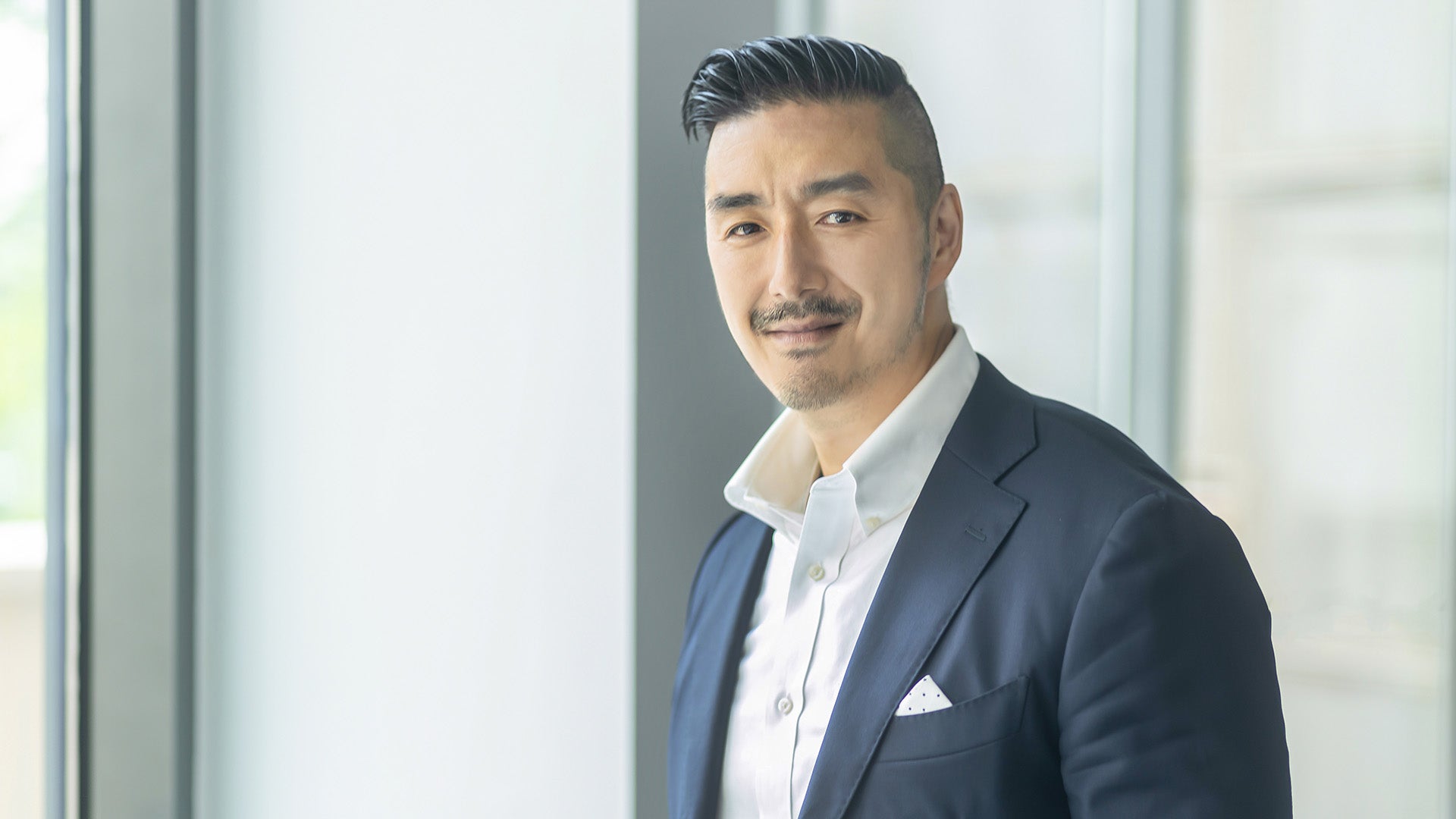
“We build trust and empathy into our digital medicine tools by understanding what quality of life means to the users,” says Professor Dean Ho, Head, Department of Biomedical Engineering.
Professor Ho is a pioneer in harnessing digital technology and artificial intelligence (AI) to revolutionise healthcare, focusing on using AI-driven platforms to personalise and optimise treatments, moving away from a one-size-fits-all approach in healthcare.
From cancer treatment to monitoring biomarkers to optimise identified health indicators, he envisages a world where such personalised interventions are accessible to all.
To that end, he has gathered a team of engineers and clinicians, social scientists, behavioural economists, industrial designers, and health economists to ensure that the technology moves out of the lab into the real world. Or in as stated in the tagline of his department – From Bench to Bedside.
Placing the patient first, seeing them as a ‘story and not a snapshot’, Prof Ho intends to make an impact where it really counts, for anyone that needs it!
Read more in the article here.
Gene platform promises improved cancer cell therapies
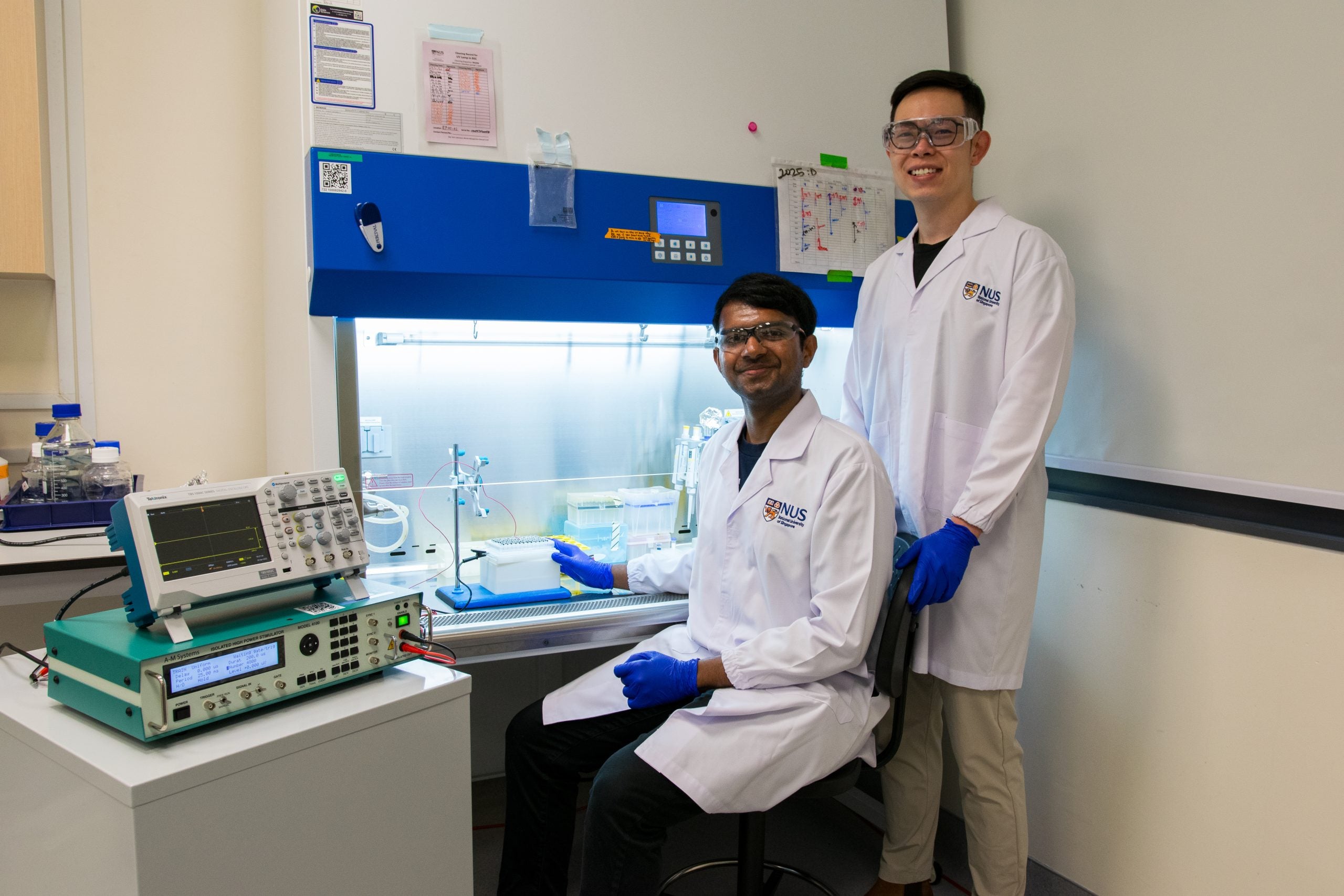
A new gene delivery platform promises to make cutting-edge cancer cell therapies faster, safer and more efficient, potentially widening patient access to life-saving treatments.
The non-viral system, known as Nanostraw Electro-actuated Transfection (NExT), has been developed by researchers led by Assistant Professor Andy Kah Ping Tay (Biomedical Engineering and the Institute for Health Innovation and Technology). It uses tiny hollow nanostructures and mild electrical pulses to deliver biomolecules — such as proteins, mRNA and gene-editing tools — into immune cells with high efficiency and minimal damage.
Read more here.
CDE alumni named in Forbes' 30 Under 30 Asia 2025
Congratulations to Hardik and Kang Hui on being named to the Forbes 30 Under 30 Asia list! The 10th edition of the Forbes 30 Under 30 Asia list, released annually, shines a spotlight on the next generation of leaders, entrepreneurs and changemakers. Candidates to the list are evaluated on a variety of factors, including funding and/or revenue, social and industry impact, inventiveness and potential.
Professor Biplab Sikdar, Head of the Department of Electrical and Computer Engineering, said: “Hardik's work on bringing AI-powered infrastructure to address inefficiencies in manufacturing is the perfect example of innovation that makes meaningful impact and industry transformation. The ECE family is proud to see Hardik on the list, and we look forward to celebrating his continued achievements in the years ahead.”
Professor Saif A Khan, Head of the Department of Chemical and Biomolecular Engineering, said: “Heartiest congratulations to Kang Hui on this well-deserved recognition. Kang Hui truly embodies the spirit of the engineer-entrepreneur — at CRecTech, he is advancing cutting-edge catalytic reactor technologies to solve energy problems at scale. All of us at ChBE are so proud of his achievements!”
We look forward to seeing them build on this success!
Division of Industrial Design shines at CHI 2025
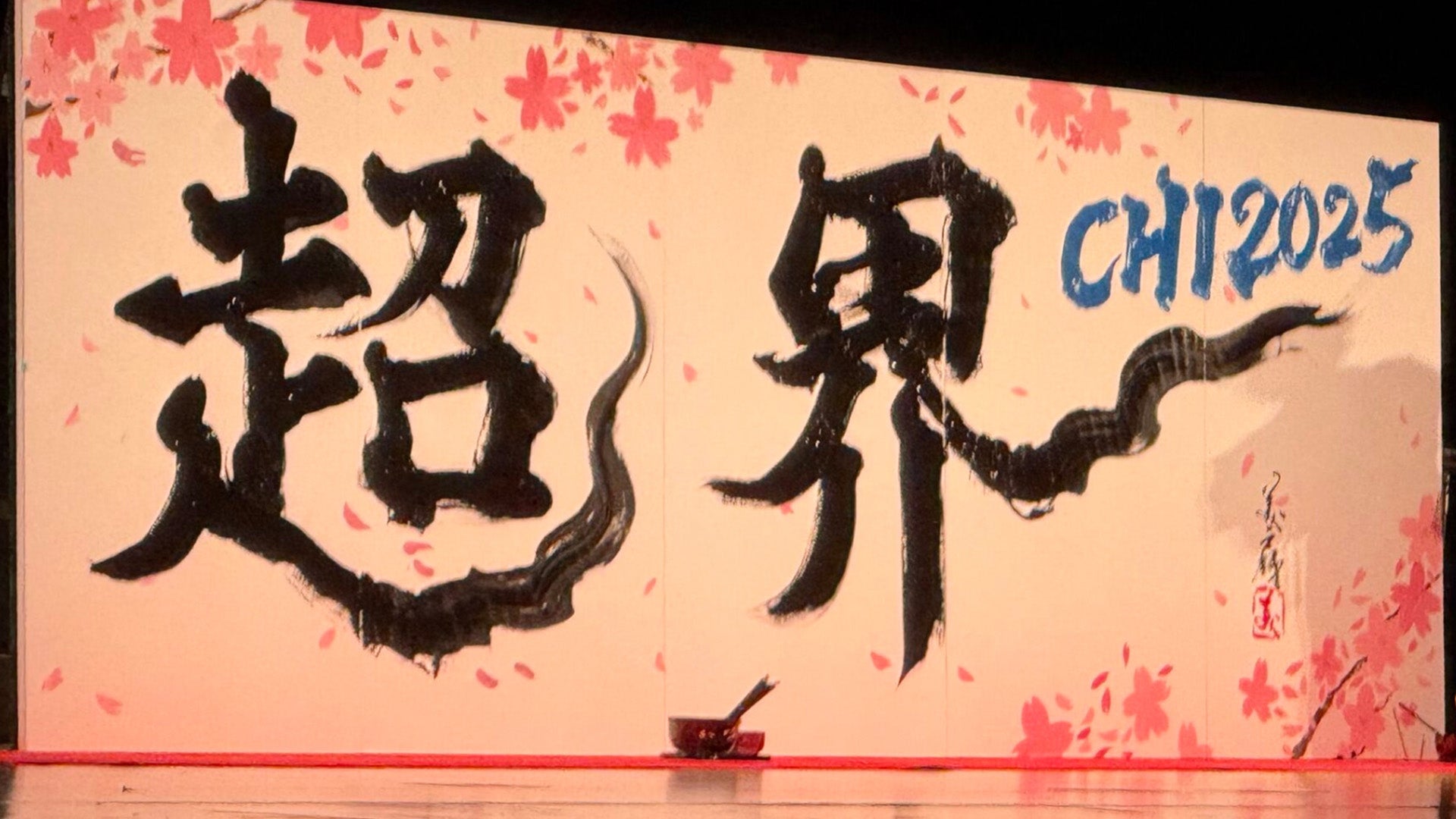
From award-winning papers to thought-provoking workshops and studies, a strong showing by Division of Industrial Design (DID) researchers at CHI 2025, the world’s leading conference for Human-Computer Interaction (HCI), held recently in Yokohama, Japan.
DID researchers contributed across full papers, workshops, late-breaking studies, and alt.chi — a special track for unconventional or forward-thinking ideas in HCI.
“We had many professors from our division at the CHI conference this year,” said Assistant Professor Clement Zheng, who was also part of the programme committee for this year’s conference. “Each of us championed a different front which collectively strengthened our presence at this huge conference despite being a small division.”
Their projects explored topics from immersive triage training and programmable ceramic textures, to screen-time interventions for healthier eating and interactive materials inspired by ancient papermaking.
Three of DID's full papers received Honourable Mention Awards, placing them in the top 5%:
Other full papers explored computational papermaking and triboelectric sensing for physical interaction design, offering new tools and approaches for craft-based and materials-driven HCI:
Assistant Professor Cho Janghee also contributed to community discourse and agenda-setting through:
- A workshop on teens and mobile technology, focusing on cross-cultural and inclusive research directions.
- An alt.chi paper proposing a more-than-human perspective on rest, grounded in ecological and Daoist frameworks, with Dr Kristina Mah, from the University of Sydney, and Evgenii A Timofeev, from the University of Melbourne.
- A late breaking study examining the complex effects of AI literacy on fact-checking behaviour among LLM users, with Assistant Professor Minjin (MJ) Rheu of Loyola University Chicago.
These contributions highlight DID's continued commitment to pushing the boundaries of HCI through thoughtful investigation into the social and material dimensions of this field. The researchers have presented these works at the conference, which was held from 26 April to 1 May in Yokohama, Japan.
Ultra-tough hydrogel inspired by bamboo
How do you make a soft, lightweight material tough enough to stop a steel ball?
A new bamboo-inspired hydrogel developed at CDE can do just that — and lift over 50,000 times its own weight.
In this video, Assistant Professor Zhai Wei (Mechanical Engineering) and her researchers Dong Xinyu and Zhuo Hao, share how they engineered this ultra-tough, flexible material using sustainable, bio-based ingredients.
Watch to see the hydrogel in action, and how it could shape the future of protective gear, medical devices, and soft electronics.
New data-driven method reveals how (un)predictable complex systems can be

A team led by Assistant Professor Gianmarco Mengaldo of the Department of Mechanical Engineering, CDE, together with doctoral student Dong Chenyu and collaborators Dr Davide Faranda (LSCE, France), Assistant Professor Adriano Gualandi (University of Cambridge, UK), and Professor Valerio Lucarini (University of Leicester, UK), has developed a novel method for estimating the predictability of complex dynamical systems.
Their work (https://www.pnas.org/doi/10.1073/pnas.2420252122), published on 16 May 2025 in the Proceedings of the National Academy of Sciences (PNAS), introduces a technique called Time-Lagged Recurrence (TLR) that tackles a fundamental question in science and engineering: given a system’s current state, how far into the future can we reliably predict its behaviour?
Read more at CDE Research News.
Harnessing AI for smarter asset servicing: Start-up finaXai partners with Deutsche Bank
In the data-heavy world of finance, the transformative aspect of AI cannot be downplayed.
Assistant Professor Gianmarco Mengaldo, from NUS Mechanical Engineering, is co-founder of finaXai, which operates at the exciting intersection of AI applications in finance.
Alongside co-founder Professor Erik Cambria, Asst Prof Mengaldo, through finaXAI, has partnered with Deutsche Bank to explore how AI can enhance the servicing of tokenised investment funds.
This initiative builds on Project DAMA 2, a pilot programme focused on multi-chain asset servicing, which aims to improve efficiency through blockchain technologies. The partnership will evaluate the integration of machine learning and large language models (LLMs) into asset servicing workflows.
Asst Prof Mengaldo said: "This collaboration demonstrates the significant impact that can be achieved when scientific interests align. The team based in NUS focuses on bridging human understanding with AI methods through explainable AI, and integrating existing knowledge into AI-driven solutions when beneficial.” More on his research can be viewed at https://www.mathexlab.com/
finaXai is part of the Fincubator programme at the NUS Asian Institute of Digital Finance (AIDF), jointly established with the Monetary Authority of Singapore, and the National Research Foundation to support the development of fintech startups focused on deep technology and digital finance innovation.
Major Grants Awarded
The major grants (start date in May 2025) with total project value > $1M.
| Hosting Unit | Project Title | Funding Programme (Source of Funding) |
Principal Investigator | Co-Investigator |
| CEE | Achieving a sustainable aquaculture environment with innovative biological processes | Singapore food story (SFS) R&D programme 2.0 - research translation - 2023
(NRF) |
He Jianzhong | Yang Kun-lin |
| CEE | Ammonium-fuelled carbon dioxide fixation for innovative water reclamation with reduced carbon footprint | PUB competitive research programme (water): innovative technologies across the water loop - 2024
(NRF) |
He Jianzhong | Yang Kun-lin |
| ChBE | Novel chemoenzymatic strategies for rare sugar synthesis | NRF open/general competitive research programme (NRF-CRP) - 2024
(NRF) |
Li Zhi | |
| ChBE | Carbon capture from biogas using framework materials | PUB competitive research programme (water): innovative technologies across the water loop - 2024
(NRF) |
Zhao Dan | |
| ChBE | Polycrystalline metal-organic framework membranes for molecular separations in pharmaceutical industry | (Pfizer Asia Manufacturing Pte Ltd) | Zhao Dan | |
| NERI | Surveillance of per- and polyfluoroalkyl substances (PFASS), polymer additives and uv filters in the urban water cycle | PUB competitive research programme (water): innovative technologies across the water loop - 2024
(NRF) |
Gin Yew-Hoong, Karina | |
| MSE | Schaeffler-NTU Corporate Lab: Intelligent Mechatronics Hub | Industry alignment fund - industry collaboration projects (IAF-ICP) - 2025
A*STAR / Schaeffler (Singapore) Pte Ltd |





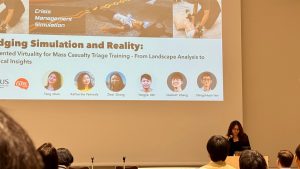
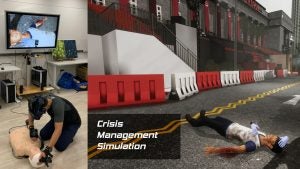
![May_CHI2025_Designing Physical Interaction_XinLiu Designing Physical Interaction - Xin Liu (Research Fellow, NUS Center for Additive Manufacturing [AM.NUS])](https://cde.nus.edu.sg/wp-content/uploads/2025/05/May_CHI2025_Designing-Physical-Interaction_XinLiu-300x169.jpg)
